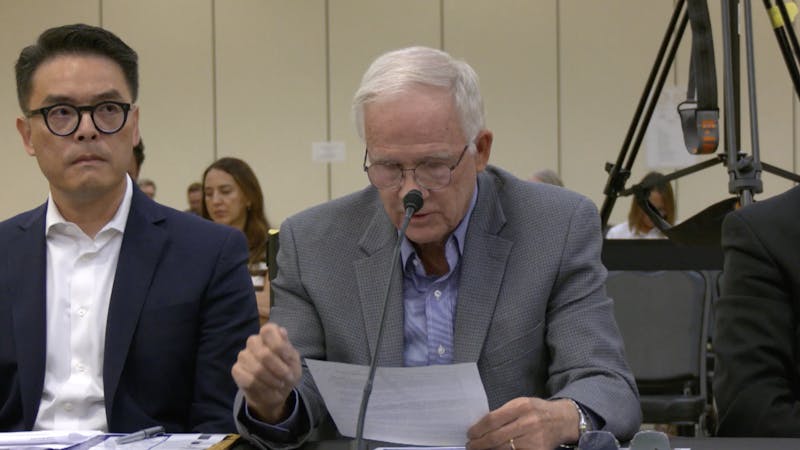Student behavior can help reduce servery food waste, says Housing and Dining
The six serveries at Rice are among the most frequented places on campus, yet most students are unaware of what takes place behind the scenes in order to produce and serve roughly 1.3 million meals per school year.
One factor that plays a significant role in all the serveries’ decisions is sustainability, according to Housing and Dining Senior Business Director David McDonald. McDonald said a key part of being sustainable is finding ways to reduce food waste.
According to McDonald, food waste can be broken into two categories: pre-consumer and postconsumer. The former involves the production of food in the kitchen before it goes to the line.
“There are a couple ways to reduce pre-consumer food waste, the easiest of which is to buy food that’s already pre-made, which we don’t do, since 90 percent of our food is made from scratch,” McDonald said. “The other way is to have excellent chefs.”
McDonald explained that the serveries are run by 15 American Culinary Federation certified chefs, who are equipped with the knowledge and experience to prepare raw ingredients with minimal waste.
“This level of expertise in the kitchen is one of the main reasons, if not the best reason, that we have very little pre-consumer waste in the kitchen,” McDonald said.
Richard Johnson, director of the Rice Administrative Center for Sustainability and Energy Management, said employing high-quality chefs is essential.
“This is not your traditional school cafeteria ‘reheat’ staff who are making minimum wage,” Johnson said. “These are knowledgeable workers. They know how to cut pineapple to minimize waste, how to utilize whole plants for multiple dishes and how to transform trimmings into fruit slushies and soup stock. Our chefs literally try to find a use for everything, and that’s the culture that is emphasized here.”
Another method of reducing preconsumer food waste is found in batch-style cooking process, according to McDonald. Food is parcooked in batches and prepared without its finished sauce, which is added only when it gets put on the line. The batch-cooking process reduces waste by providing an intermediary stage where unfinished products are stored and can be reutilized; McDonald said once food has been served, it must be discarded to comply with the health code.
“Once food has been served, we cannot pull it back and reutilize anything. This is when it potentially becomes the most wasteful, as any unused food must be discarded due to health code reasons,” McDonald explained.
“Take grilled chicken breast as an example,” McDonald said. “As long as I don’t put the chicken out on the line and sauce it, we can reuse the ingredient. It becomes tacos, chicken noodle soup, enchiladas — you name it.”
McDonald said another way to reduce preconsumer food waste is by consolidating serving lines. Toward the close of the meal service, as the count of students entering the servery decreases, larger serveries will reduce identical serving lines down to one. “Rather than maintaining three pans of the same food, we consolidate down to one pan in one serving area,” McDonald said. “This way the odds of having less food waste go up tremendously.”
Portion control is also fundamental to reducing waste, according to Susann Glenn, manager of communications for Housing and Dining.
“By reducing portion sizes, and even having different-sized portions available in one pan, we can help students as they’re building their plates,” Glenn said. “Smaller portions then lead to less waste on the post-consumer side.”
According to McDonald, kitchen equipment plays an important role. All the serveries are equipped with combination ovens with humidity regulators that allow chefs to simultaneously steam and bake food.
“Anytime you bake something, it loses its moisture about 10 to 20 percent, which reduces the portion size,” McDonald said. “By adding steam in certain proportions with combi ovens, our chefs are able to reduce the amount of volume loss when they prepare food, and they’re also able to reheat foods like chicken breasts for future use without sacrificing moisture.”
McDonald said both combi ovens and blast chillers, which aid in storing food for future use, make reconstituting ingredients possible.
“The technology used in the serveries plays an important role in eliminating food shrinkage and facilitating ingredient reuse,” McDonald said. “As a result we have achieved an almost waste-free pre-consumer environment.”
Initiatives have been taken to reduce post-consumer waste as well. According to Johnson, a trayless initiative reduced the amount of food wasted by students by 30 percent. Students enrolled in Environmental Issues: Rice Into the Future (ENST 302/SOCI 304) developed the initiative seven years ago, and it was passed in 2009 with support from the Student Association. Johnson said eliminating trays had benefits beyond student food waste.
“The realization that we didn’t have to purchase and cook the same amount of food in order to meet the same appetite reduced pre-consumer production by 11 percent, and by eliminating the need to wash extra plates and trays we also saved on water, electricity, cleaning chemicals and labor costs,” Johnson said.
Sustainability should be an ongoing conversation, Johnson said. Initiatives are currently in progress with students enrolled in the same course this fall to measure food waste in the servery and find ways for further improvement.
“We’re continually looking for ways to improve in the kitchen,” McDonald said. “But students themselves can play a significant role in reducing post-consumer waste as well.” Travis Kwee, a Baker College sophomore, said the effects of food waste often go unrecognized by students. “The trayless meal system is a fantastic idea,” Kwee said. “But the amount of food we waste at Rice is still high.”
According to Kwee, Rice’s buffet-style meals contribute to the food waste problem. “It’s way too easy for students to approach each meal by taking copious amounts of anything that looks interesting, and scraping whatever they don’t eat into the trash,” Kwee said. “The perception is the extra food is either a ‘free’ or sunk cost.”
As leader of the Food and Energy Waste committee of the Rice Environmental Club, Kwee said the committee’s mission is to find effective ways to connect with people and inform them about the effects of wasting extra food so they can make small, easy changes to their lifestyle.
“We’re working on increasing awareness through food waste reduction campaigns, competitions in the serveries, presentations at college government meetings and gathering and posting real-time statistics on food, water and energy consumption online,” Kwee said.
McDonald’s message to students was similar. “Student behavior directly affects pre-consumer waste,” McDonald said. “If you are taking less food on the plate, that means we are producing less food in the kitchen.” With this in mind, McDonald advised students to be cognizant of the amount of food they take at meals.
“We get the idea that students want to experiment with food, and we’re okay with that,” McDonald said. “But you can always take smaller portions and then come back for seconds. Take what you want, but eat what you take.”
More from The Rice Thresher

Rice announces Chao College as 12th residential college
Rice announced that the 12th residential college will be named Ting Tsung and Wei Fong Chao College Aug. 19. The college, set to open in fall 2026, will contain nearly 300 on-campus beds.
Dining access fund announced following on-campus unlimited meal swipes
Rice announced new food assistance programs on Tuesday to account for the controversial change in the on-campus meal swipe plan.

Rice disaster prediction model discussed at hearing on deadly Central Texas floods
The House and Senate Select Committees on Disaster Preparedness and Flooding held a hearing on July 31 in Kerrville to address the deadly July 4 flooding in Central Texas. The flooding along the banks of the Guadalupe River killed 108 people, including 37 children. In the charged hearing, Texas lawmakers and flood survivors criticized the local response to the disaster.


Please note All comments are eligible for publication by The Rice Thresher.